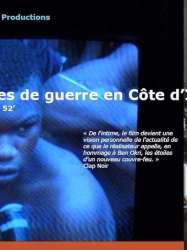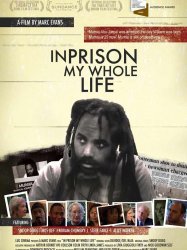Films with theme "Documentary films about politics", sorted by revenue

Ouled Lenine (2007)
, 1h21Directed by Nadia El Fani
Origin France
Genres Documentary
Themes Films set in Africa, Documentary films about law, Documentary films about historical events, Documentary films about politics, Political films
"I was ten and it was the best time of my life. In Bourguiba's independent Tunisia disappointment was starting to knock on the door, but a few of us had a common secret: We were the sons and daughters of Communists. Sh..." When they were 20 they were fighting for Tunisia's independence, and they were full of hope. Did they wait too long for the country to mature? Or did time fly by too fast for their dreams? This documentary sketches a special portrait of the progressive militants in Tunisia right after Independence was declared and wonders what heritage was left...
 , 1h7
, 1h7Origin Espagne
Genres Documentary
Themes Films set in Africa, Documentary films about politics, Political films
Morocco has spent more than 30 years denying the Saharans the right to their own life and land. In exile, the women are the pillar of their struggle; they keep the society together and keep up the fight and resistance. Their struggle, from abroad, from refugee camps, from their occupied land, shows the strength and force of the Saharan women. The "Tebraa" is the Saharan women’s song, be it of love or sorrow, and they sing when they are alone. It’s an intimate song. That’s where we have tried to go, to that place that no army can take away, that place full of pain and hope, of weariness and love, of struggle and desire.

Zeitgeist (2007)
, 2h2Directed by Peter Joseph
Origin USA
Genres War, Documentary, Historical
Themes Films based on the September 11 attacks, La mondialisation, Films about religion, Films about terrorism, Transport films, Aviation films, Documentaire sur l'altermondialisme, Documentary films about law, Documentary films about war, Documentary films about historical events, Documentary films about politics, Documentary films about religion, Documentary films about technology, Documentary films about terrorism, Political films, Films based on the Bible, Films about Islam, Dans un avion, Portrayals of Jesus in film, Films about hijackings
Actors George Carlin
The film starts with animated visualizations, film segments and stock footage, a cartoon and audio quotes about spirituality by Chögyam Trungpa Rinpoche, then shots of war, explosions, and the September 11 attacks. Then the film's title screen is given. The introduction ends with a portion of a George Carlin monologue on religion accompanied by an animated cartoon. The rest of the film is in three parts with narration by Peter Joseph.
 , 52minutes
, 52minutesDirected by Philippe Lacôte
Origin France
Themes Politique, Documentary films about politics, Political films
Des figures emblématiques de la Seconde Guerre mondiale en passant par l’accession à l’indépendance, la voix off de Philippe Lacôte relate l’histoire politique de la Côte d’Ivoire ; de Houphouët-Boigny à Laurent Gbagbo sans oublier le général Robert Gueï... le tout sur fond de sa propre histoire familiale.

Mère-Bi (2008)
, 55minutesOrigin Senegal
Genres Documentary
Themes Films set in Africa, Films about writers, Feminist films, Films about journalists, Politique, Documentaire sur une personnalité, Documentary films about politics, Political films
Née à Sokone en 1926, Annette Mbaye d’Erneville, la mère du réalisateur William Mbaye, fut la première journaliste du Sénégal. Elle s’est très tôt sentie concernée par le développement de son pays. Militante de la première heure pour la cause de l'émancipation des femmes, elle est à la fois une pionnière et une anti conformiste. Elle a partagé sa vie entre la France, où elle a étudié, et le Sénégal, où elle est retournée en 1957, pressentant que le temps de l’Indépendance était arrivé.

Slacker Uprising (2007)
, 1h37Directed by Michael Moore
Origin USA
Genres Documentary
Themes Documentary films about historical events, Documentary films about politics, Political films
Actors Michael Moore, Michael Stipe, Viggo Mortensen, Gloria Steinem, Roseanne Barr, Tom Morello

The Soviet Story (2008)
, 1h25Directed by Edvīns Šnore
Origin Lettonie
Genres War, Documentary, Historical
Themes Documentary films about war, Documentary films about historical events, Documentary films about politics, Political films, Documentary films about World War II, Disaster films
Actors George Bernard Shaw

In Prison My Whole Life (2008)
, 1h39Directed by Marc Evans
Origin United-kingdom
Genres Documentary
Themes Prison films, Films about terrorism, Documentary films about law, Documentary films about war, Documentary films about historical events, Documentary films about politics, Documentary films about terrorism, Political films, Films about capital punishment, Documentary films about law enforcement
Actors Mos Def, Snoop Dogg
Au moment même où William Francome nait, le 9 décembre 1981, un homme est arrêté pour le meurtre d’un policier de l’autre côté de l’Atlantique. Cet homme est noir, journaliste et ancien Black Panther. Il s’appelle Mumia Abu-Jamal.
 , 1h11
, 1h11Origin Ivoire
Genres Documentary
Themes Politique, Documentary films about politics, Political films
En 1988, la jeunesse sénégalaise descend dans la rue pour contester la réélection du président Abdou Diouf. Ces manifestations ont été les premiers signes d’une rupture générationnelle. C’est dans ce contexte qu’est né le mouvement « Boul Fallé », qui signifie « se foutre de tout et tracer sa route ». Dès le départ, Boul Fallé va se distinguer en s’exprimant dans la musique hip-hop et dans la lutte avec frappe. La réalisatrice Rama Thiaw sans faire l’historique de ce mouvement cherche à en restituer l’énergie. Des studios d’enregistrement de la banlieue de Pikine aux arènes de sable, sa caméra nous entraîne dans le rythme de ceux qui ont choisi de redevenir ce qu’ils sont : de nobles guerriers.

The Door of Ceuta (2008)
, 1h50Origin Portugal
Genres Documentary
Themes Films set in Africa, Films about immigration, Documentary films about politics, Political films
Beginning with the 2005 violence at the Melilla and Ceuta border fences, Bab Sebta interviews people in four North African cities to explore why some people are willing to risk all to emigrate to Europe. Interviews took place in Tangier and Oujda in Morocco, and Nouadhibou and Nouakchott in Mauritania.
 , 1h10
, 1h10Origin Canada
Genres Documentary
Themes Films set in Africa, Documentary films about law, Documentary films about war, Documentary films about historical events, Documentaire sur une personnalité, Documentary films about politics, Political films
Nadine Bari takes us down a road in Guinea as she searches for her husband. As she does, she tells us of the long battle she faced to get the Guinean authorities to tell her what had happened to her husband after he disappeared. Hopeful and desperate, her story is similar to that of thousands of women who are still trying to discover what became of their husbands, fathers, brothers or sons during Sékou Touré's dictatorship.

Our Forbidden Places (2009)
, 1h45Directed by Leïla Kilani
Origin France
Genres Documentary
Themes Films set in Africa, Films about families, Documentary films about law, Documentary films about war, Documentary films about historical events, Documentaire sur une personnalité, Documentary films about politics, Political films
In 2004, the King of Morocco launched an Equity and Reconciliation Commission to investigate state violence during the Years of Lead. For three years, the film follows four families in their search for the truth: Activist, young rebel soldier or simple citizen, either they or their relations were imprisoned in different parts of Morocco. Each person tries to "find out", discover a "reason", to be able to mourn. But forty years later, the state secret finally unveils the existence of another, more intimate secret, the family secret. They all feel the need to reconstruct history and recover their parents, taken from them twice over, once by their disappearance and another by the secret. Choosing between deeply set silences, lies and taboos within and outside the families, over forty years.

Sea Point Days (2008)
, 1h36Origin South africa
Genres Documentary
Themes Films set in Africa, Films about racism, Documentary films about racism, Documentary films about law, Documentaire sur une personnalité, Documentary films about politics, Documentary films about cities, Political films
Alongside the southernmost urban centre in Africa, separating city from ocean, lays a very special strip of land. Set against the beautiful backdrop of the Atlantic Ocean on one side and Signal Hill on the other, the Sea Point Promenade – and the public swimming pools in its centre – forms a space unlike any in Cape Town. Once a bastion of Apartheid exclusivity, it is nowadays unique in its apparently easy mix of age, race, gender, religion, wealth status and sexual orientation. Somehow this space has become one where all South Africans feel they have a right to exist, and where the possibility of happiness in a divided world doesn't seem unfeasible. But what is the reality of those coming here? How do people see their past, their present in this space and their future in this country?

Budrus (2010)
, 1h10Directed by Julia Bacha
Origin USA
Genres Documentary
Themes Films set in Africa, Films about religion, Documentary films about law, Documentary films about war, Documentary films about historical events, Documentaire sur une personnalité, Documentary films about politics, Documentary films about religion, Political films, Films about Jews and Judaism
Jordana Horn in The Jewish Daily Forward states that: Budrus [is] a documentary by Julia Bacha that examines one West Bank town’s reaction to Israel’s construction of the security barrier. The town, with a population of 1,500, was set to be divided and encircled by the barrier, losing 300 acres of land and 3,000 olive trees. These trees were not only critical for economic survival but also sacred to the town’s intergenerational history. The film tells the story of Ayed Morrar, a Palestinian whose work for Fatah had led to five detentions in Israeli jails, but whose momentous strategic decision that the barrier would be best opposed by nonviolent resistance had far-reaching ramifications.

Bougafer 33 (2010)
, 52minutesOrigin Maroc
Genres Documentary
Themes Films set in Africa, Documentary films about law, Documentary films about war, Documentary films about historical events, Documentary films about politics, Political films
Taking the expedition of a group of Frenchmen following in the tracks of their fellow countrymen as a starting point, Bougafer 33 is a journey through time and space that tells of the battle that took place in 1933 at the foot of the Bougafer Mountain during the war Morocco fought against the French-Spanish colonial conquest. Eyewitness accounts, stock footage, written tales and songs all contribute to reinstate the history of the last resistants of the Ait Atta. An epic ordeal of fierce and highly organized battles in which women and children took part in the name of freedom.
 Connection
Connection